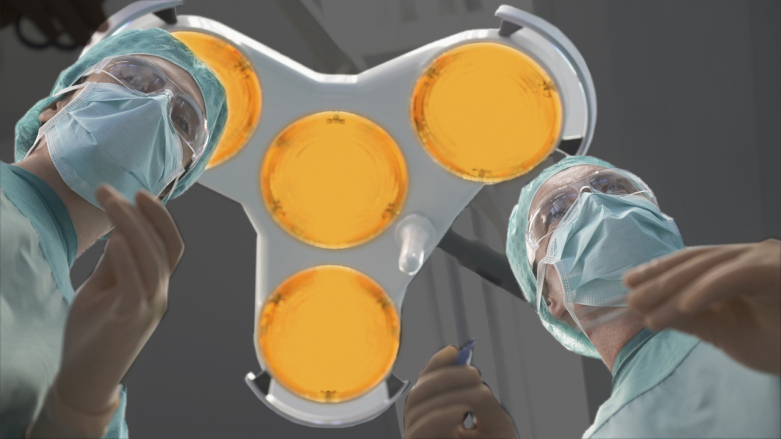

They say you never forget your first time seeing an unconscious man in his mid-fifties, lying in surgery wearing what may as well be a disposable table cloth, entrails spilled out over his chest while bloody-armed surgeons rummage merrily through his biological pipework, with the barbeque smell of cauterised flesh wafting in your general direction.
Strictly speaking, I’m not sure ‘they’ do say that, but I promise you it’s true. Or the second time either, come to think of it.
I must admit, when I sit at my mercifully blood-free desk overlooking the British Museum, my days studying medicine couldn’t feel further away.
When people find out that I used to be a medic - or at least on my way to becoming one -
half are puzzled as to why I, with my passion for Shakespeare and my inability to watch a Quentin Tarantino film (or Titus Andronicus, frankly) with my eyes open, would ever have wanted to be a doctor in the first place. The other half wonder why I made the switch to English literature, and eventually to PR.
To the first group: you ask a fair question, and indeed the answer is sometimes easy for me to forget. But medicine and English aren’t as far apart as some people might think.
Somewhat unusually for a medicine personal statement, mine included a quotation from Ian McEwan, who suggests that ‘literature is the basis of all sympathy, empathy and compassion’. I had to defend this claim in an interview with a bespectacled medical academic, whose interest in Keats would start and end with his TB diagnosis.
But at least to a degree, I think McEwan is right. Literature is about getting inside someone else’s head, seeing the world from someone else’s point of view and coming as close as possible to realising that maybe, just maybe, other people are as complicated as you are.
And while empathy isn’t all it takes to be a good doctor, it certainly helps.
But there’s a lot more to medicine than being interested in other people. Learning the anatomy of the kneecap is no doubt of enormous interest to some, but as I discovered soon enough, it wasn’t to me.
And, at least until you get to a very, very senior level, there’s not a lot of room in medicine for ‘blue-sky thinking’. This is not a criticism per se: I wouldn’t want my surgeon improvising a new method for a routine appendix removal, either. But it does mean that medicine isn’t the most fulfilling environment for a self-described (albeit probably only self-described) ‘creative’ type.
And so, much to the alarm of many around me, I laid down my stethoscope and began reading English literature. Ringing in my ears were the words of Robin Williams from Dead Poets’ Society: ‘Medicine, law… these are noble pursuits necessary to sustain life. But poetry, beauty, romance, love, these are what we stay alive for’.
All very Romantic, no doubt. But why did I then choose a career in PR?
As I studied English – which for the record I hugely enjoyed I came to the happy conclusion that I didn’t need to become an academic to maintain my love of poetry.
What I enjoyed most, however, was the opportunity to spend my days trying to get inside the minds of other people, and the opportunity to strive for insights rather than memorisation. These became challenges that I didn’t really think I could live without, and that is huge part of what drew me to PR.
An important part of PR is to do with reputation, personal and corporate. It’s a slippery concept: it’s abstract and unquantifiable, but also invaluable. Overwhelmingly it’s never set in stone and can be fragile. When a company wants to build – or in times of crisis, protect- its reputation, PRs use all sorts of skills to help their clients.
As important a skill as any, surely, is the ability to understand how other people are thinking. You need to put yourself in the minds of journalists, employees and the wider public, if you’re going to have any chance of presenting a message in the way that is most meaningful to the audience you’re targeting.
And the terribly clichéd but hugely exciting concept of ‘blue-sky thinking’ is absolutely essential in PR when trying to keep up with an increasingly tumultuous world. Sitting down with my colleagues to brainstorm campaign ideas or crisis management strategies feels refreshingly detached from my long ago Ebayed anatomy textbooks.
In the past couple of years, I’ve helped a few of my friends prepare for interviews for graduate medicine courses. I’ve never tried to persuade anyone not to become a doctor: for those that it excites, it’s about as fulfilling and worthwhile a job as any ever could be.
But, perhaps as having an Ian McEwan quotation in my personal statement should have given away, my own calling lay elsewhere.
And of course, as an added bonus: nine months into my career in PR, and not a disconcertingly visible internal organ in sight.
By Jonty Head, PR consultant at Paternoster Communications